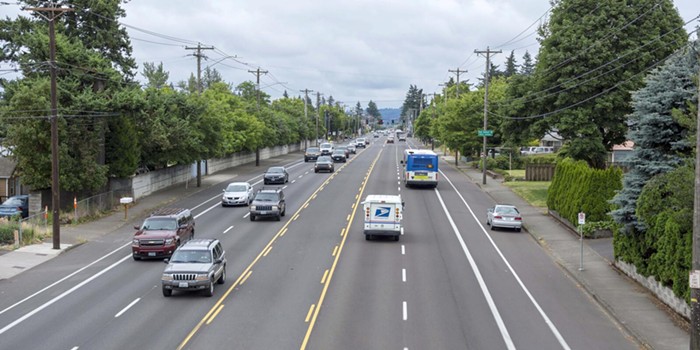But what happened next is still unclear. According to witnesses, there was a fight on SW 3rd and, at 2:36 am, several shots were fired. A 26-year-old man fell, shot in the chest.
It was the third shooting near downtown clubs in as many months--and now police and lawmakers appear to be seizing on the incidents as an opportunity to clamp down on the city's clubs and after-hours nightlife.
Last weekend, in response to the so-called trend of shootings, police rolled out a 40-foot mobile police station and assigned more officers to roam the streets of Old Town during the after-midnight hours. Even though the shooting the previous weekend had occurred when two officers were standing no further than a block away, police have theorized that their increased presence will deter further gunplay. (Moreover, in spite of the highly publicized shootings, the actual number of aggravated assaults downtown has dropped nearly 20 percent so far this year.)
At press time, police were still uncertain whether they would continue the increased patrols for this weekend. But the mayor's office has also entered into the fray, hoping to talk with club owners about ways to calm down their clientele. And as always, the OLCC is waiting in the wings, ready to conduct its own investigation into the most recent shooting. If the OLCC can establish a connection between the shooter and a specific club, that club faces fines and could potentially lose its license.
Though there has yet to be any proven link between the shootings and downtown clubs, in press conferences and interviews, the police have tried to establish that the clubs are at least partially responsible for the shootings. Police spokesperson Sergeant Brian Schmautz said that officers think "over-serving" patrons is an underlying cause for violence on the streets and that some clubs are "catering to the younger clientele," which he hinted was the gangsta crowd. He didn't specifically name any clubs.
The shootings have also pressed the question about how much responsibility clubs should shoulder for their patrons' behavior after leaving their bars. For the past two years, that very question has been a hot-button topic ever since the city passed the so-called "Time, Place, Manner" Ordinance. Under that ordinance, if a club or tavern receives three complaints within a month, the city can limit the businesses' hours of operation and even shut down the establishment as a public nuisance.
The recent shootings downtown--and several others near clubs in Northeast Portland--have given neighborhood advocates additional ammo for convincing the cops to keep drinking establishments on a tight leash.
On the flip side, during the latest legislative session in Salem, the legislature have been considering a bill that would severely limit the city's "Time, Place, Manner" Ordinance. Under HB 2056, bar owners would be shielded from liability for incidents that occur off site. In June, that bill passed the House of Representatives. Since then, it has stalled in the Senate and, with the legislative session winding down, its chance for passing is now remote.
Even so, proponents and protectors of the "time, place, manner" ordinance remain on vigilant watch. City Council Member Randy Leonard, who has championed the ordinance, has traveled to Salem twice to testify against HB 2056.
Representative Diane Rosenbaum (D-Portland) also posted a plea against the bill posted on the News4Neighbors website (www.news4neighbors.net)
Clearly, some of Portland's leading politicians do not plan to let clubs and bars off the hook for street violence any time soon. If you would like to sound off about what responsibility (or freedoms) clubs should have, a public meeting is planned. For exact time and location, contact Maria Rubio at the mayor's office, 823-4120


















